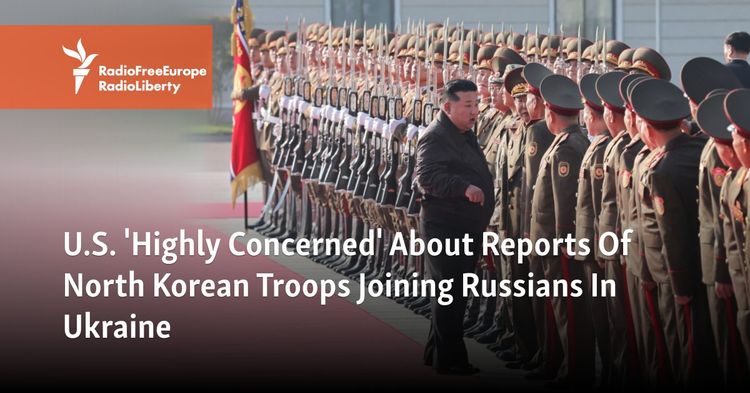U.S. 'Highly Concerned' About Reports Of North Korean Troops ...

The world’s leading industrial nations warned Iran to stop supporting the Hamas and Hezbollah militant groups and other nonstate actors in the Middle East and to cease actions that are helping to destabilize the region, while Washington also urged Israel to scale back its attacks near Beirut amid ongoing fears of a potential all-out war.
The Group of Seven (G7) developed economies, in a joint statement on October 19, said they "call on Iran to refrain from providing support to Hamas, Hezbollah, Huthis, and other nonstate actors, and taking further actions that could destabilize the region and trigger an uncontrolled process of escalation."
Gaza-based Hamas is designated as a terrorist organization by the United States and European Union. Hezbollah has also been designated terror group by the United States, while the EU blacklists its armed wing but not its political unit, which has members in the Lebanese parliament.
Hamas, Lebanon-based Hezbollah, and the Huthi rebels in Yemen -- also deemed a terrorist organization by the United States -- are considered Iranian proxy organizations in the Middle East.
Following its summit in Italy, the G7 -- the United States, Italy, Canada, Britain, France, and Japan -- said it remains "united in supporting the need for an immediate cease-fire in Gaza," the release of all hostages, and a "significant and sustained increase" in the flow of humanitarian aid to Gaza.
The statement also said the G7 is troubled by the latest events in Lebanon and "the risk of further escalation."
It expressed concerns over "all threats" to the security of the UN Interim Force in Lebanon (UNIFIL), which has complained of dangers to its staff amid the Israeli military's air and ground operations in southern Lebanon near the Israeli border.
Separately, U.S. defense chief Lloyd Austin said Washington would "like to see" Israel scale back some of its attacks in and around Beirut.
"The number of civilian causalities have been far too high. We would like to see Israel scale back some of the strikes in and around Beirut and we would like to see a transition to negotiations that would allow civilians on both sides to return to their homes," he said following the G7 summit in Naples.
U.S. Vice President Kamala Harris on October 19 said the killing of Hamas leader Yahya Sinwar presented an opportunity for a cease-fire in the Middle East.
"This creates an opening that I believe we must take full advantage of to dedicate ourselves to ending this war and bringing the hostages home," Harris told reporters.
"As it relates to the issues in the Middle East and in particular in that region, it has never been easy. But that doesn't mean we give up. It's always going to be difficult."
The statements come after Iranian Supreme Leader Ayatollah Ali Khamenei said Hamas "will remain alive" despite the death of Sinwar.
Khamenei said in a statement on October 19 that Sinwar's "loss is undoubtedly painful for the Axis of Resistance," referring to a self-described network of several Iran-backed groups in the Middle East, including Hamas.
"But this front did not cease advancing with the martyrdom of prominent figures," Khamenei added.
Sinwar -- the architect of the October 7, 2023, Hamas attack on Israel that triggered the war in Gaza -- was killed by Israeli forces on October 16. His death was confirmed by a top Hamas political official the following day.
The situation remains tense in Gaza, where at least 50 people including children were killed in Israeli air strikes on October 19, Palestinian health officials said.
At least 10 of them were killed in central Gaza when a house was hit in the town of Zawayda, according to the Al-Aqsa Martyrs Hospital, where the casualties were taken.
Another attack killed 11 people, all from the same family, in the Maghazi refugee camp, according to the Al-Aqsa Martyrs Hospital in Deir al-Balah.
The Israeli government said that a drone was launched toward the house of Israeli Prime Minister Benjamin Netanyahu in the coastal town of Caesarea on October 19, with no casualties. Neither Netanyahu nor his wife were home, his office said in a statement.
Netanyahu later said that the "agents of Iran who attempted to assassinate" him and his wife "made a bitter mistake."
The drone strike came in the morning as sirens wailed in Israel, warning of incoming fire from Lebanon.
In Lebanon, authorities said two people were killed in an Israeli strike on October 19 in Jounieh, north of Beirut.
Jounieh, a Christian-majority town, had not been hit since Israel and Iran-backed Hezbollah started exchanging cross-border fire over the Gaza war last year.
Israel intensified its bombardment of Lebanon on September 23 and later in the month sent ground troops across the Lebanese border.
The strikes have reached areas outside of traditional strongholds of Hezbollah, which is designated as a terrorist organization by the United States, while the European Union blacklists its armed wing but not its political party.
Hezbollah's political wing has seats in the Lebanese parliament and the militants control the southern part of the country that borders Israel.
Elsewhere, pro-Iranian groups in Iraq overran offices of Saudi broadcaster MBC after it aired a report referring to commanders of Tehran-linked militant groups as "terrorists."
More than 400 people "wrecked the electronic equipment, the computers, and set fire to a part of the building," an Iraqi Interior Ministry source told AFP.
The source said the fire had been put out and that police had dispersed the crowd.
With reporting by AP, AFP, and Reuters








































